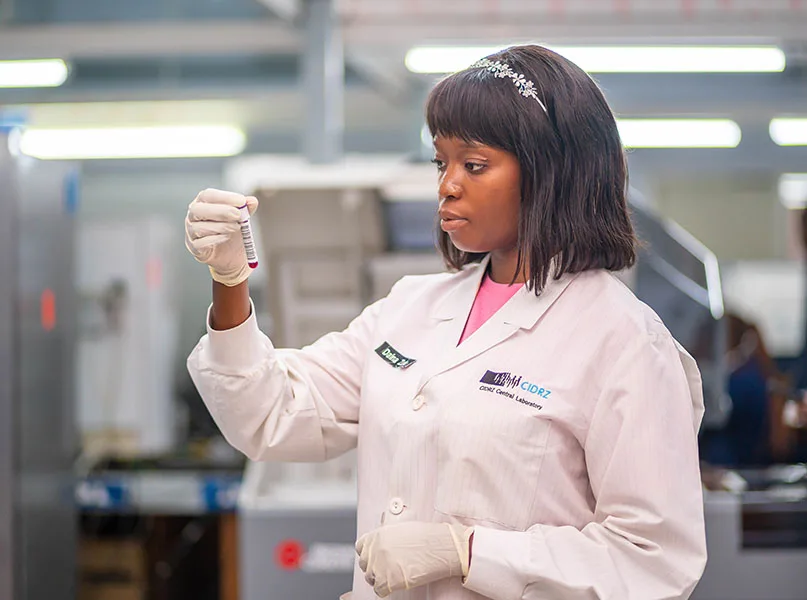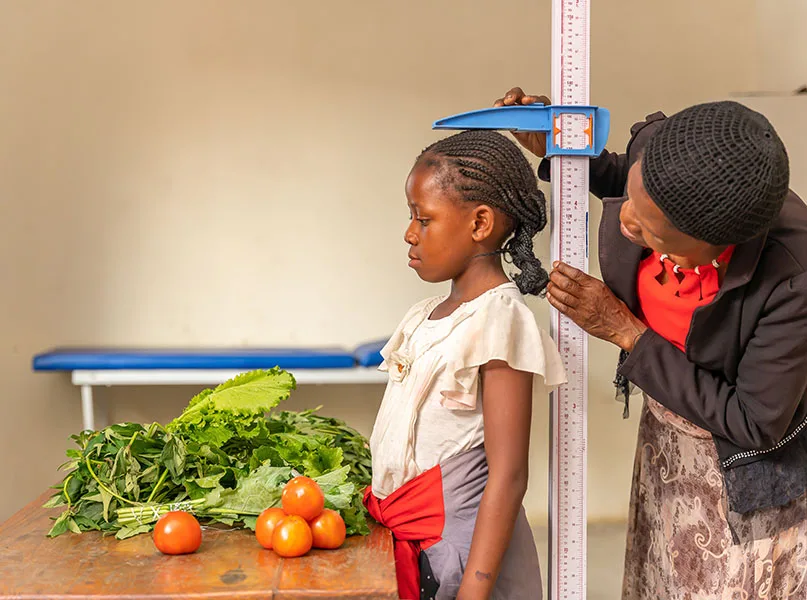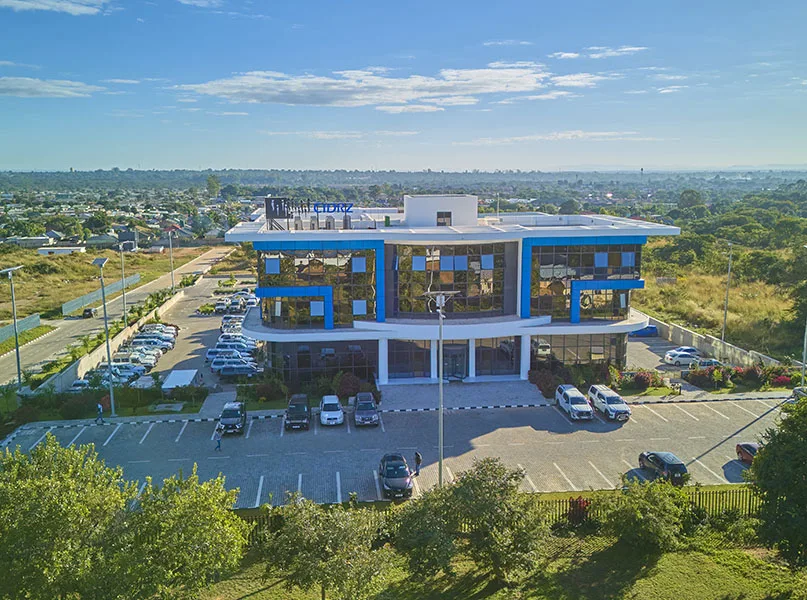On a mission to become a beacon of excellence for medical research, the Centre for Infectious Disease Research in Zambia is improving access to quality healthcare through innovative R&D and impactful, sustainable public health programmes. Dr Monde Muyoyeta, Chief Scientific Officer, reveals more.
RESEARCHING FOR A HEALTHIER ZAMBIA
Since we last spoke to the Centre for Infectious Disease Research in Zambia (CIDRZ) in 2020, the nation’s healthcare sector has progressed significantly.
Zambia’s HIV levels, for example, have now achieved epidemic control status, whilst the incidence of tuberculosis (TB) has reduced and case detection has increased, despite Zambia being amongst the 30 highest TB-burdened countries in the world.
However, the risk of future HIV and TB cases rising again has become more prevalent following recent changes to the US government, as Zambia has been a prior recipient of the US President’s Emergency Plan for AIDS Relief (PEPFAR) and funding from the US Agency for International Development (USAID) for the last 20 years.
Whilst both funds still exist, their future remains uncertain with ongoing discussion around potential funding cuts.
CIDRZ is a Zambian non-government, non-profit organisation that works to improve health outcomes through research, service delivery, and training.
Founded in 2001, the organisation partners with the Zambian Ministry of Health and other stakeholders to address public health priorities with a strong focus on HIV and AIDS, TB, hepatitis, and maternal and child health.

The organisation is known for implementing evidence-based health programmes, conducting large-scale clinical and operational research, and building local capacity through training and mentorship.
“CIDRZ combines scientific innovation with practical health solutions to strengthen Zambia’s health systems and improve lives,” introduces Chief Scientific Officer, Dr Monde Muyoyeta.
With a footprint spanning all 10 provinces of Zambia, CIDRZ continues to collaborate closely with the Zambian Ministry of Health, particularly on the HIV and TB programmes.
Its research is mainly focused on the country’s capital, Lusaka, but has more recently expanded to the Copperbelt Province through the Social Science Research Group (SSRG) and the TB department.
In total, CIDRZ boasts 1,185 dedicated staff working across its programmes and portfolio of
research projects, which continues to expand having recently added human papillomavirus (HPV) and HIV cure research to its undertakings.

LOCALLY AND REGIONALLY RELEVANT
As per its mission – to improve access to quality healthcare across Zambia and beyond – CIDRZ conducts both locally and regionally relevant research.
Through its work, the organisation has been able to identify gaps in Zambia’s healthcare sector and advocate for international research and grant applications as it evolves alongside the government’s wider health agenda.
“We are now also focused on building our science capacity which will ultimately lead to medicine discoveries,” Muyoyeta discloses.
This development also resonates with national vaccine manufacturing strategies, medicines, and medical devices.
With the construction of a new head office in Lusaka completed last year and ongoing plans to modernise its research labs, CIDRZ anticipates continuing to make great strides in the research space.
“Our wonderful new head office has brought the whole team together under one roof. Having our own headquarters is strategically important, particularly in terms of sustainability,” she reflects.
The new facility will capacitate the organisation’s basic science infrastructure and allow it to be competitive in both the basic and translational scientific research spaces, as it will have capacity to support bigger projects.

INVESTING IN THE FUTURE
CIDRZ’s commitment to advancing public health research in Africa is strongly reflected in its postgraduate training initiatives, namely its PhD Fellowship and MSc by Research Studentship.
Under the second phase of the Developing Excellence in Leadership, Training, and Science in Africa (DELTAS Africa) initiative, meanwhile, which is supported by Wellcome Trust via the Science for Africa Foundation, CIDRZ currently provides training and mentorship to one mid-career investigator, two postdoctoral fellows, four PhD candidates, and seven MSc students.
Beyond DELTAS Africa, the organisation’s education portfolio includes partnerships with other funding bodies such as the Schlumberger Foundation, which supports African women in research.
“So far, we’ve successfully trained three women at PhD level through this funding mechanism,” Muyoyeta prides.
In addition, the organisation’s collaboration with the Integrated Networks of Scholars in Global Health Research Training (INSIGHT) programme currently funds one postdoctoral fellow.
Elsewhere, CIDRZ’s flagship training programme, led by CIDRZ faculty members and visiting university mentors, seeks to build Zambia’s future health leaders through hands-on, high-impact field work and research.

“At the heart of sustainable health systems lies the capacity of local professionals,” she explains.
Through the programme, guided by industry professionals with over two decades of experience, CIDRZ delivers structured mentorship and real-world learning across clinical research, implementation science, public health, and data analytics.
“The training programme supports students, early-career scientists, and public sector professionals through fellowships, internships, and targeted skills-building workshops, with alumni now serving in leadership roles across government, academia, and international health organisations,” Muyoyeta adds.
Strategic investment in CIDRZ’s training platform directly fuels a pipeline of well-equipped professionals driving innovation in healthcare and research – not only in Zambia but across the region.
“Supporting this programme is not just a commitment to education – it’s an investment in health equity and Africa’s scientific future.”

DIGITAL DEVELOPMENTS
Digitalisation and the presence of digital solutions have grown tremendously across CIDRZ in recent years, improving its access, efficiency, and impact across the healthcare sector.
“Digitalisation has increased our reach to rural populations, reduced paperwork, and improved real-time data accuracy by empowering users with decision support tools,” Muyoyeta tells us.
In addition, CIDRZ’s data centre is complete with the latest technologies, with various applications like enterprise resource planning (ERP), human resources management, and data collection tools like DHIS2, REDCap, and ODK for projects with cloud-based applications, providing users and partners with access to real-time data and reports.
CIDRZ has also implemented various mobile health applications such as SMS campaigns and field data collection, which utilise mobile phones and tablets to allow health workers to gather data on mobile devices in the field, online, or offline.
The organisation currently has various applications for digital mapping, alongside dashboards for integration and tracking project management activities to provide efficient and real-time reporting.
CIDRZ’s ICT department has developed various in-house applications with internal software development which includes lab, fleet, procurement, and retirement management systems.

POISED FOR A BRIGHT FUTURE
Supporting advanced diagnostics, disease surveillance, and cutting-edge science, the CIDRZ Central Laboratory is accredited by the Southern African Development Community Accreditation Service (SADCAS).
“The lab plays a vital role in infectious disease monitoring, including HIV, TB, COVID-19, and emerging pathogens whilst serving as a trusted partner to the Zambian Ministry of Health and global research institutions,” Muyoyeta confirms.
Beyond diagnostics, CIDRZ is expanding its basic science portfolio to deepen understanding of disease mechanisms, host immunity, and antimicrobial resistance.
With dedicated bioinformatics capacity, biobanking infrastructure, and a team of expert scientists, CIDRZ is uniquely positioned to contribute to global health breakthroughs from an African perspective.
“Investment in this space will accelerate locally-driven innovation, foster regional leadership, and ensure timely response to future public health threats,” she emphasises.
Going forwards, another of CIDRZ’s key priorities is to grow the next generation of Zambian and African research leaders.
“We aim to be a recognised centre of excellence for research in Zambia and beyond, with a fully-fledged R&D programme contributing to local and regional aspirations for developing vaccines, medicines, and medical devices,” she passionately concludes.
































